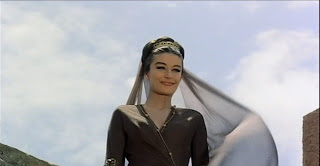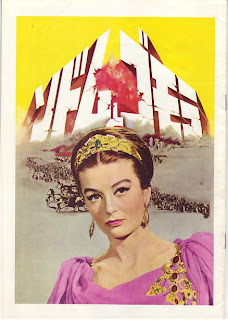And other details such as censorship cuts and the soundtrack make me want to talk about it.
Though I must admit: I have a soft spot in my heart for this film and that is my first motivation.
I remember seeing it as a child at my grand ma's and the show blew me away. Yes, because, in spite of the title, the film remains quite decent. In it, Sodomites are barely the inhabitants of Sodom, lesbianism is reduced to a few insistent gazes, all of which can very well go unnoticed for a young naive and pure child (which I was back then). Not a tit shot, not even a curse word, nothing.
This Italian-French-American co-production did not meet an overwhelming success even though it was released in many countries. Maybe it's the origins (Italian productions of the time often look somewhat cheap to me) at a time when the sword-and-sandal genre was beginning to wane in popularity. Have you noticed how Italian extras, as opposed to over-enthusiastic American ones, always seem to be waiting the end of the scene to get their paycheck? Maybe it's just me.
By now, you're probably wondering : "What's so special about this film, then?"
 Apart from a few details like the involvement of two future long-time James Bond collaborators : Ken Adam for production design and Maurice Binder for his highly stylized main title sequences, the on-screen presence of Stewart Granger (Moonfleet, The Prisoner of Zenda,...), and pretty Pier Angeli, this film has two main attractions : Anouk Aimée and Miklós Rózsa's music.
Apart from a few details like the involvement of two future long-time James Bond collaborators : Ken Adam for production design and Maurice Binder for his highly stylized main title sequences, the on-screen presence of Stewart Granger (Moonfleet, The Prisoner of Zenda,...), and pretty Pier Angeli, this film has two main attractions : Anouk Aimée and Miklós Rózsa's music. Let's start with Anouk Aimée.
Let's start with Anouk Aimée.I've always loved the parts of beautiful, cruel, poker-faced women with power. They fascinate me. The Queen in Snow White, Ayesha in "She", and the Queen of Sodom.
The latter is, to my knowledge, never mentioned by name in the movie but is listed as "Queen Bera" on the IMDB and various other sources.
Anouk Aimée, who was never prettier than in this film, parades with a detached face but really has power of life and death over the people that surround her and she uses rivalries and the court intrigues to get rid of the one person that can rightfully resist her: her brother, with whom she cultivates a very peculiar relationship. But her influence over him and his final execution resemble a cat-and-mouse game: slow and vicious so she can see her victim suffer and relish it.
As sovereign of Sodom and Gomorrah, the Queen choses her prettiest slave to make her the favorite from whom she demands more obedience than the film can depict. But the innuendos are there.
In the end, she can only be defeated by the only entity who can defy her power : God. The scene of her tragic fate impressed upon me as a child : all alone, abandoned, without a sound (her favorite screams in her place), she faces death and with her falls the symbol of her kingdom.
The character is fascinating, but the talent of the actress (not to mention her beauty) are really what made it work for me. I saw Anouk Aimée on the stage playing Love Letters, and in another English-speaking role besides "Sodom" (she dubs herself in the French version) in a TV episode called, "Voices In The Garden" where she plays the tragic part of a sick woman whose last days are brightened by her meeting with a couple of teenagers.

Her voice charmed me every time.
I was very surprised to read in an interview by Boze Hadleigh of director George Cukor, who ordinarily remains so consensual, that he thought working with her (on Justine) had been one the worst experiences of his career. According to him, her attitude was "intractable. Like Marilyn but without the results". I don't know what their differences were on that shoot, but I have to say I disagree on that last comment. Whatever attitude she had, the results are there. But I must admit that Anouk Aimée never had the career she could expect in the USA. However that may have been a choice.
Back to the film. About the soundtrack, this is Rózsa's last score (Quo Vadis, Julius Caesar, Diane, King of Kings, Ben Hur,... ) for this kind of movie. And what a score! The theme of the two cities marvelously conveys decadence and power mixed together. The amateur had to wait a long time before he could buy a relatively satisfying recording.
A double LP album offered a large selection of the music (although not a complete one), but in the digital era, one could expect better. A 64 minute CD was released in 1990 albeit with a monaural sound and strange cuts right in the middle of the cues. In 2001, another CD, this time in stereo, gathered only 43 minutes of music without even including the main title.
Not until 2007 did Digitmovies release a double CD copying the content of the LP with 6 extra unused cues (5 Hebrew prayers and one dance). If these discs offer the most complete selection to date (and probably all that's left of the actual soundtrack), some cues are incomplete and others missing altogether (the main title is cut 2 minutes 20 seconds in at the most inappropriate time in all of these editions).
But the soundtrack got royal treatment compared to the film itself. Look for a DVD release (I don't even mention Blu-Ray) and weep. I bought the VHS tape some ten years ago. Obviously the film was not restored and was presented in the 4:3 picture format, but except for the overture, intermission and epilogue (all on the CD), the film was complete.
 In the French version for instance (the film was shot in English), Tamar's torture scene was censored and the shots showing the spikes on Arno's torso are missing, which gives the impression that Tamar is dying of a big hug.
In the French version for instance (the film was shot in English), Tamar's torture scene was censored and the shots showing the spikes on Arno's torso are missing, which gives the impression that Tamar is dying of a big hug.An official DVD with an English soundtrack saw the light of day in Germany. If the format of the picture is adapted to wide-screen TV, it seems that various copies of different quality were mixed together which gives a frankly disturbing result. And the main title is also cut in several places (including the first seconds) with the consequences you can imagine on the listening pleasure.
More or less legal but always deceptive editions come up everywhere in the world: in Asia, on two discs with a randomly chosen cut (clumsy considering the fact that the film has an intermission), or in Brazil where the film is "letter-boxed" (black strips at the top and bottom).
 If god wants it (and especially if 20th Century Fox does), some day maybe, Sodom And Gomorrah will rise from the ashes! Hear the Queen call you : "Stay! I command you to stay !"
If god wants it (and especially if 20th Century Fox does), some day maybe, Sodom And Gomorrah will rise from the ashes! Hear the Queen call you : "Stay! I command you to stay !"There will be more about the film...
More pictures on A Lost Film Facebook page.
That's all for today folks!























0 comments:
Post a Comment